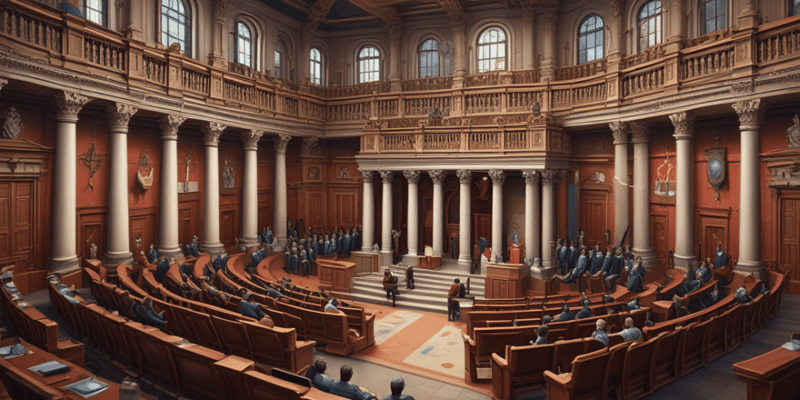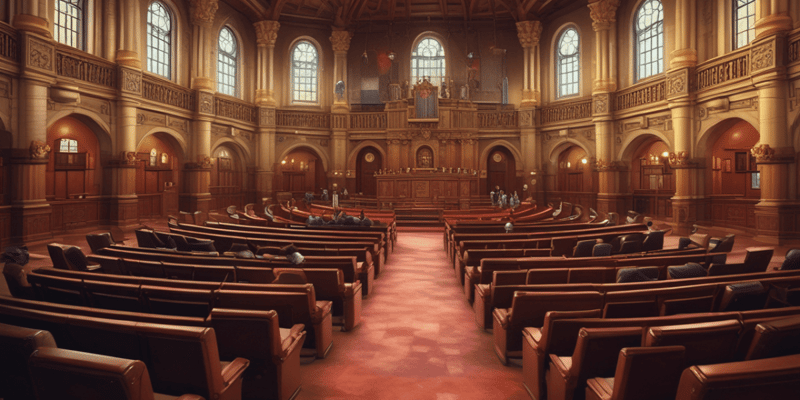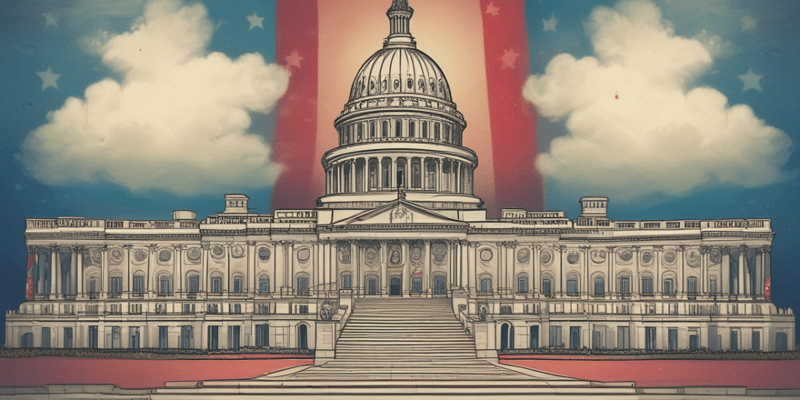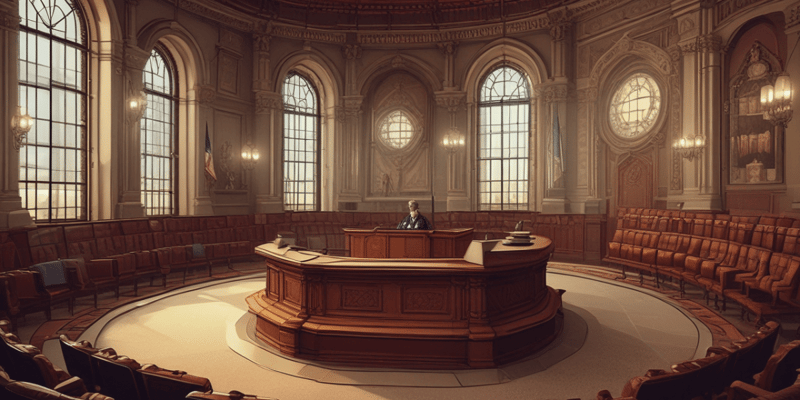Questions and Answers
What does the adoption of legislation involve?
It involves different stages, readings, and processes before a legislation is accepted and issued.
Who must sign a Bill before it becomes law at the parliamentary level?
The President must sign the Bill.
What is the purpose of promulgation in the legislative process?
Promulgation is the process that makes legislation operational and formally puts it into effect.
In what medium must legislation be published to take effect?
Signup and view all the answers
What happens to Acts of parliament or provincial Acts upon publication?
Signup and view all the answers
What are municipal by-laws required to do in order to be enforced?
Signup and view all the answers
Who signs a Bill passed by a provincial legislature?
Signup and view all the answers
What does the term 'legislation' refer to once it is adopted?
Signup and view all the answers
What does 'commencement' mean in a legal context?
Signup and view all the answers
When does the 'day' begin according to Section 13(2)?
Signup and view all the answers
What is the general presumption regarding the application of legislation?
Signup and view all the answers
Under what condition may legislation be applied retroactively?
Signup and view all the answers
What case established the presumption that legislation applies to future matters?
Signup and view all the answers
What could rebuff the presumption of future applicability in legislation?
Signup and view all the answers
According to common law, how does an expressly retroactive Act affect previous transactions?
Signup and view all the answers
How can a court determine a retroactive intention in legislation?
Signup and view all the answers
What is the general rule regarding the retroactive application of procedural legislation?
Signup and view all the answers
What was the outcome of the case Euromarine International of Mauren v The Ship Berg regarding retroactive legislation?
Signup and view all the answers
How did the court in Minister of Public Works v Haffejee warn against assuming retroactivity?
Signup and view all the answers
When does the presumption against retroactive legislation not apply?
Signup and view all the answers
What distinction exists between procedural rules and substantive rights?
Signup and view all the answers
What implications does retroactivity have for new claims or disputes born from previous facts?
Signup and view all the answers
Can procedural and evidence rules be retroactive under certain conditions?
Signup and view all the answers
Why might a court be cautious about retroactive provisions?
Signup and view all the answers
What was the main finding of the court in R v Sillas regarding the amending Act?
Signup and view all the answers
In R v Mazibuko, what principle did the court uphold regarding increased penalties?
Signup and view all the answers
What does Section 35(3)(1) of the Constitution ensure for accused persons?
Signup and view all the answers
How does Section 35(3)(n) of the Constitution protect accused persons concerning punishments?
Signup and view all the answers
What fundamental rights are established by the Constitution regarding retrospective offences?
Signup and view all the answers
Why might the legislature intend to minimize burdens on its subjects, as referenced in R v Sillas?
Signup and view all the answers
What does the 'presumption against retrospectivity' imply in legal terms?
Signup and view all the answers
What is the significance of the term 'other considerations' in legal judgments like R v Sillas?
Signup and view all the answers
Study Notes
Adoption of Legislation
- Legislation undergoes various stages and readings before being accepted by the legislative body.
- Adoption processes for Acts of parliament and provincial Acts are outlined in the Constitution.
- Once adopted, a Bill must be signed by the President or the provincial premier.
- Although signed, the Act is not yet operational until it is promulgated.
Promulgation
- Promulgation is the formal process by which legislation takes effect and becomes operational.
- This involves publication in an official gazette.
Publication
- Acts of parliament and provincial Acts come into effect upon publication in the Government or Provincial Gazette.
- Municipal by-laws become enforceable after being published in the relevant provincial Gazette.
Commencement of Legislation
- Commencement denotes the day a law becomes operational, typically the day of gazette publication.
- According to section 13(2), the day begins immediately after midnight, effectively allowing retrospective commencement.
Presumption Against Retrospectivity
- Legislation is generally presumed to apply to future matters unless explicitly stated otherwise.
- A clear intention for retroactive application must be communicated to avoid unfair outcomes.
- Case law supports the notion that procedural changes can apply retroactively without infringing on vested rights.
Impact of Retroactive Legislation
- Retroactive provisions affecting procedural rules do not automatically modify existing rights but may affect enforcement.
- Case examples illustrate distinctions between substantive rights and procedural adjustments.
Favorable vs. Unfavorable Retroactive Legislation
- Retroactive legislation that benefits individuals may be applied, as seen in R v Sillas, which reduced a penalty.
- Conversely, amendments that increase penalties apply the presumption against retrospectivity, as in R v Mazibuko.
Constitutional Protections
- Section 35(3)(1) guarantees the right to a fair trial, protecting individuals from being convicted for acts that were not offenses at the time committed.
- Section 35(3)(n) ensures offenders receive the least severe punishment available if laws change between the commission of the crime and sentencing.
- These provisions emphasize that offenses and penalties cannot be applied retroactively, safeguarding fundamental rights within the Constitution.
Studying That Suits You
Use AI to generate personalized quizzes and flashcards to suit your learning preferences.
Description
Test your knowledge on the adoption, promulgation, and commencement of legislation. This quiz covers key concepts and processes involved in how Acts of parliament and provincial Acts become operational, including the role of publication in an official gazette.




